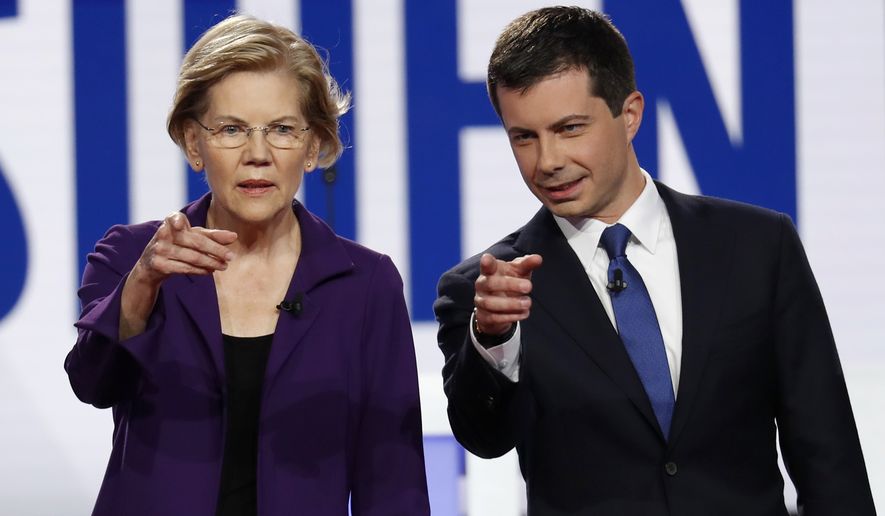GREENWOOD, S.C. — Sen. Elizabeth Warren sailed into the fourth Democratic presidential debate in October with the wind at her back after emerging as the candidate to beat in the early primary states.
A month later, however, the Massachusetts senator’s support has flattened out, suggesting she has her work cut out for her as she looks to regain her momentum when she walks onto the stage Wednesday night for the fifth debate in Atlanta.
Charlie Cook, of the nonpartisan Cook Political Report, said Ms. Warren had “enjoyed open field running” until the last month or so when “suddenly a lot of people started assuming that she would be the Democratic nominee” and began focusing on her calls for “big structural change.”
“With that title of being a front-runner came scrutiny and criticism, both of Medicare for All, and its implications on private, employer-provided health care, but also on the potential cost of the rest of her agenda and tax hikes that could result from it,” Mr. Cook said. “Not that Democrats are against big-spending programs or taxes, but they are against losing this election. Many started worrying that her electability problem was on policy grounds.”
Ms. Warren’s plateauing in the polls has coincided with Pete Buttigieg’s rise.
The South Bend, Indiana, mayor now leads in Iowa and perhaps has been the biggest beneficiary of former Vice President Joseph R. Biden’s struggles. The 37-year-old casts himself as the moderate alternative to far-left Ms. Warren and Sen. Bernard Sanders of Vermont.
His surge is expected to lead to more scrutiny — including over whether Mr. Buttigieg has the experience to do the job and his ability to woo black voters who have been a central part of the Democratic coalition.
Former Massachusetts Gov. Deval Patrick’s late primary bid and signs that former New York City Mayor Michael Bloomberg is next have added to the unsettled nature of the contest.
David Paleologos, director of the Political Research Center at Suffolk University, said Wednesday’s debate marks a possible “inflection point” for Ms. Warren, who has never been tested in a grueling primary race during her political career.
“She has to take control of the race again and she needs to do that by engaging Pete Buttigieg and she also needs to convince progressives that this year is her year and not Bernie Sanders’ [year] because both of those factors are directly in her way,” he said. “Buttigieg is now leading in Iowa and Sanders is pulling progressive support away from her and it is clear that Sanders is not going to get out of the race, nor is she.”
Mr. Sanders got a big boost last month when liberal freshman Rep. Alexandria Ocasio-Cortez of New York backed his bid.
Ms. Warren has created some separation from Mr. Sanders by promising that her Medicare for All plan would not require middle-class tax hikes and saying that she would not seek to pass a Medicare for All bill until her third year in office. Mr. Sanders says taxes on working families would rise under his plan, but that people would be paying less out of pocket for health care because of the elimination of premiums, deductibles and copayments.
Mr. Buttigieg, meanwhile, has argued, along with Mr. Biden, that the Medicare for All push is too much, too fast for most Americans, arguing that people who like their private health insurance should be able to keep it.
Ms. Warren also is taking arrows from business leaders, most notably from Mark Cuban, the billionaire owner of the NBA’s Dallas Mavericks, who accused her of being “intellectually dishonest” with Americans and being “very Trumpian” by scapegoating the rich.
“They are taking a page from Donald Trump’s winning playbook,” Mr. Cuban said during a recent appearance on Fox Business. “You know, you pick a group of people and you demonize them to the base, and to the far-left base, it is really easy to demonize me and the other 606 billionaires in the country.”
For her part, Ms. Warren has relished the beef.
She started selling “Billionaire Tears” mugs on her campaign website, betting the public spat with the uber-wealthy will help more than hurt her chances of winning the Democratic nomination by firing up liberal activists and others who think attacking the wealthy is smart politics.
“Her decision to lean into it is brilliant,” said Neil Sroka, spokesman for Democracy for America.
“One of the biggest problems facing this country is income and wealth inequality, and frankly the best thing billionaires could do for their own interest is to stop talking about Elizabeth Warren, because every time they do, a growing number of people are going to be on Elizabeth Warren’s side, and they are bringing more attention to the fact that they are scared of the Warren presidency,” he said.
The debate, sponsored by MSNBC and The Washington Post, will feature 10 candidates.
Joining Ms. Warren, Mr. Buttigieg, Mr. Biden and Mr. Sanders on stage will be: Sens. Cory A. Booker of New Jersey, Kamala D. Harris of California and Amy Klobuchar of Minnesota; Rep. Tulsi Gabbard of Hawaii; entrepreneur Andrew Yang; and billionaire activist Tom Steyer.
• Seth McLaughlin can be reached at smclaughlin@washingtontimes.com.




Please read our comment policy before commenting.